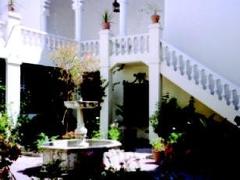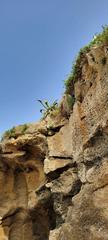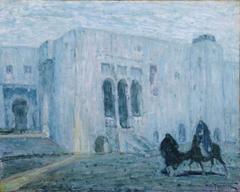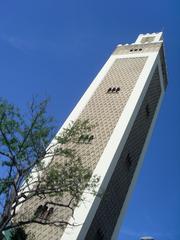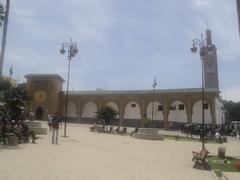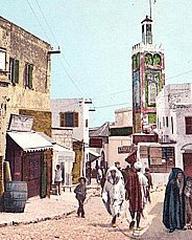Church of Saint Andrew Tangier, Morocco: Visiting Hours, Tickets, and History
Date: 15/06/2025
Introduction
Nestled in the heart of Tangier, Morocco, the Church of Saint Andrew is a testament to the city’s multicultural heritage and vibrant history. Established in the late 19th century on land graciously gifted by Sultan Moulay Hassan I, this Anglican church uniquely blends British ecclesiastical traditions with Moroccan and Islamic architectural elements. Today, it stands as a symbol of religious tolerance, artistic fusion, and the city’s cosmopolitan spirit, drawing visitors from around the world who seek to experience its serene atmosphere and rich cultural legacy (Morocco World News; Atlas Obscura).
This comprehensive guide details the church’s history, architectural highlights, visiting hours, ticket information, accessibility, notable events, and nearby attractions — equipping you with all you need for a meaningful visit.
Historical Overview
Origins and Foundation
The origins of the Church of Saint Andrew date back to the late 19th century, a period marked by growing British influence in Tangier, then an important international port. Responding to the needs of the expatriate, diplomatic, and military community, the British sought a dedicated Anglican place of worship. Sultan Moulay Hassan I’s donation of land in 1880 symbolized Morocco’s openness and recognition of the city’s diverse population (Tangier Free Church; Morocco World News).
Construction and Early Years
Construction began in 1894, and the church was completed and consecrated in 1905. The design, attributed to Edward Elgar (son of the renowned composer), blends traditional Anglican architecture with Moroccan influences: a minaret-inspired bell tower, horseshoe arches, and intricate stucco work. This unique blend reflects Tangier’s spirit of coexistence and artistic exchange (Atlas Obscura).
Architectural Evolution
Over the years, the church has been expanded and restored, with additions such as a chancel, vestry, and a memorial chapel honoring those lost in the World Wars. The churchyard, shaded by mature trees, contains the graves of notable expatriates and community members, providing a peaceful resting place and a tangible connection to Tangier’s international past (The Guardian).
Cultural and Religious Significance
During Tangier’s era as an International Zone (1923–1956), the church became a hub for the city’s diverse expatriate community, hosting services, social gatherings, and cultural events. Its architectural features — such as the Lord’s Prayer inscribed in Arabic and the blend of Moorish and Anglican motifs — underscore its role as a bridge between faiths and cultures (Discover Islamic Art; Lonely Planet).
After Moroccan independence, the church adapted to a shrinking expatriate community, but remains active, welcoming a diverse congregation and visitors from all over the world. It continues to promote interfaith understanding and cultural dialogue (Morocco World News).
Visitor Information
Visiting Hours and Tickets
- Opening Hours: Typically open daily from 9:00 AM to 6:00 PM (may vary on holidays and during special events; check locally or via official channels for updates).
- Admission: Free; donations are welcome to support ongoing maintenance and restoration (Travelling Foot).
- Guided Tours: Available upon request, often provided by church staff or the caretaker. Guided experiences offer deeper insights into the church’s history, architecture, and community role (Atlas Obscura).
Accessibility
- Wheelchair Access: The church is wheelchair accessible via ramps at the main entrance; some uneven surfaces in the garden and cemetery may require caution.
- Location: 50 Rue d’Angleterre, Socco, Tangier 90040, Morocco. Located near the city center and Grand Socco, easily reachable by foot, taxi, or public transport (Europe Anglican).
Architectural Highlights
Exterior
- Bell Tower: Designed in the style of a Moroccan minaret, the bell tower features geometric patterns and a crenellated parapet, integrating the church visually with Tangier’s skyline.
- Entrance: A pointed horseshoe arch, wooden canopy, and glazed Moroccan tiles adorn the main entrance.
- Gardens and Cemetery: The well-kept churchyard includes graves of diplomats, soldiers, writers, and local community members, offering a peaceful space for reflection (Away With The Steiners).
Interior
- Nave and Columns: Marble columns arranged in a paired (gemelled) style evoke both Romanesque and Islamic hypostyle traditions.
- Chancel: Accessed through a festooned horseshoe arch, crowned with floral decoration and framed by an Arabic inscription of the Gospel.
- Muqarnas Niche: Behind the altar, a niche features intricate muqarnas plasterwork and the Nasrid motto “There is no victor but God,” symbolizing cultural links with Andalusia.
- Ceilings: Painted wooden ceilings with interlaced star patterns showcase the skill of Moroccan artisans.
Artistic Significance
- Interfaith Symbolism: The Lord’s Prayer inscribed in Arabic and the use of Kufic script to render Christian texts exemplify the church’s role as a site of interfaith respect.
- Craftsmanship: Local artisans contributed woodwork, plaster, and tile, rooting the church in Moroccan artistic traditions (Discover Islamic Art).
Notable Events and Personalities
The churchyard includes the graves of prominent figures such as Sir Harry MacLean, Emily Keene (the Sherifa of Wazzan), and various diplomats and soldiers. The church’s archives and memorials provide insight into Tangier’s international legacy (The Guardian; Commonwealth War Graves Commission).
Nearby Attractions
Enhance your visit by exploring Tangier’s other historical sites, most of which are within walking distance of the church:
- Grand Socco: A lively plaza and gateway to the medina.
- Kasbah and Dar el-Makhzen: The city’s ancient fortress and museum.
- Petit Socco: A historic square in the medina, ideal for people-watching.
- Church of the Immaculate Conception: Tangier’s Roman Catholic church.
- Fondation Lorin: A museum dedicated to local history and culture.
- Forbes Museum: Military miniatures and memorabilia.
- Tangier American Legation Museum: The only US National Historic Landmark outside the US (PlanetWare; Trek Zone).
Visitor Tips
- Dress modestly out of respect for the church’s religious significance.
- Photography is permitted in most areas; avoid flash and be respectful during services.
- Best times to visit: Mornings or late afternoons for tranquility and cooler temperatures.
- Language: English and French widely spoken by staff.
- Duration: 30–60 minutes is ideal for exploring the church and gardens.
- Safety: The area is generally safe; usual travel precautions apply.
Frequently Asked Questions (FAQ)
Q: What are the Church of Saint Andrew’s visiting hours?
A: Open daily from 9:00 AM to 6:00 PM; check locally for updates.
Q: Is there an entrance fee?
A: No, but donations are appreciated.
Q: Is the church wheelchair accessible?
A: Yes, with ramps at the main entrance.
Q: Are guided tours available?
A: Yes, inquire on-site or with local tourism offices.
Q: Can I attend a service?
A: Yes, all visitors are welcome to attend Anglican services, especially on Sundays.
Q: Are there other attractions nearby?
A: Yes, including the Grand Socco, Kasbah, medina, and several museums.
Summary and Travel Advice
The Church of Saint Andrew is a must-see for anyone interested in architecture, history, or cultural diversity. Its unique blend of British and Moroccan elements, tranquil gardens, and welcoming atmosphere make it an outstanding stop on any Tangier itinerary. For the latest updates on visiting hours and events, consult official church channels or download the Audiala app for personalized travel tips and guides (Holidify; Travelling Foot).
Sources and Further Reading
- Morocco World News
- Atlas Obscura
- Discover Islamic Art
- Holidify
- Travelling Foot
- Europe Anglican
- PlanetWare
